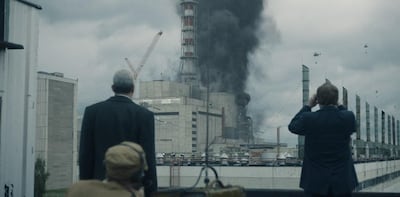The nuclear power industry has been urged to do a better job of promoting itself after public fears about the energy source were fuelled by the hit HBO series Chernobyl.
Mohamed Al Hammadi, chief executive of the Emirates Nuclear Energy Corporation, said the mini-series, which catalogued a series of mistakes leading to the tragic 1986 nuclear plant meltdown and its devastating aftermath, had spread "myths" about nuclear power.
He said assertive public information campaigns were needed to educate people about the benefits of nuclear power, revealing how Enec had launched its own successful PR drive after the 2011 Fukushima disaster.
Despite the reputation of nuclear power generally taking a hit after the Japanese accident, Mr Al Hammadi said that public opinion of nuclear energy in the UAE, which is building its first nuclear plant, had improved on the back of the organisation's efforts.
"Recently, HBO [broadcast]a mini-series," Mr Al Hammadi said. "From a public viewership, it had more [viewers] than Game of Thrones, which is one of the most popular TV shows. It had a lot of myths, and no fact-based stories about what happened in Chernobyl. That needs public education … that this is a safe, clean and reliable source of energy."
On Monday, at a panel discussion at the World Energy Congress about the future of nuclear energy, a string of experts cited public opinion as the major barrier to the further development of new reactors, more than other factors such as cost and the time it takes for projects to be built.
Industry experts said nuclear should be seen as a vital and clean energy source that plays a key role in fighting climate change.
However, in many countries it remains highly controversial, with opponents worried about the creation of radioactive waste and the disaster that would ensue if something goes wrong.
Mr Al Hammadi said he convinced his own environmentally-conscious 17-year-old daughter of the merits of nuclear energy by explaining how using it helped to reduce emissions.
"[I said] imagine a solution that will be environmentally clean, an abundant source of energy," he said. "That's what your father is doing, working on a project that will eliminate 20 million tonnes of [carbon dioxide] emissions on an annual basis.
“She said that’s an even greater solution than what she’s thinking about, about not buying plastic bags. That was her mission in life.
“We have a young generation very interested in trying to save the world and sustainability. I see a golden opportunity for our technology to be marketed, and put in the right position, for a younger generation.”
Mr Al Hammadi has been at the helm of the Al Barakah Nuclear Power Plant project since 2008. The plant is now close to completion.
He said the project had survived the financial crisis because of the UAE government's commitment to it, as well as the Fukushima disaster despite other countries abandoning or curtailing their civilian nuclear programmes.
He was abroad when the Japanese disaster happened, but quickly launched a campaign that ensured that the public remained supportive.
"We checked, and in the Arabic language, if you [went to] Google at that time, it [was] not about the civilian use of nuclear, but bombs, war happening, and all that," he said.
“So we said 'that’s an opportunity for us. Why don’t we translate the facts and the science, and everyone is interested to listen'. We put that for the public, a couple of days later, I was on TV talking about hard, scientific facts.
"We got a lot of attention from the Arab world, not just the UAE. We went from 67, 68 per cent of public acceptance, to around 82 [per cent], because we saw it as an opportunity to educate the public. With nuclear technology we cannot sit back and say, 'the public is not accepting it and we don't have an option'."
Other panelists backed Mr Al Hammadi's call for more effective campaigns.
Xavier Ursat, executive director of energy giant EDF, said that France had successfully overcome public opposition to its nuclear energy programme in the 1970s and 80s.
"The biggest fight we have in front of us is against climate change," he said. "And we are not winning the battle. We need to decarbonise our economies and we need low carbon electricity. There are two ways to produce low carbon electricity – renewables and nuclear.
“One issue is public acceptance. It’s not easy to speak about nuclear [energy]. Everyone can feel the wind on their face, see the water dropping, feel the sun. But what is nuclear? It is difficult to understand.
“We have to work together, very carefully, on the way we speak about nuclear. We have a brilliant explanation about nuclear [energy], but most of the time, you need to have a degree in physics or mathematics. We do not speak to the heart of people, we speak to their brain.
"Most of the time, in public debates, the media field, the political field, we are dealing with nuclear [energy] as if it was a religion or ideology. We need to show people who work in [the] nuclear [energy field that] it needs to have a visible face, not this mysterious energy that people don't know how it is produced."


